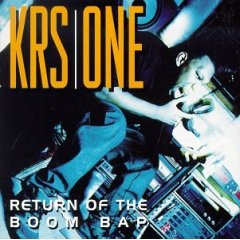| Return of the Boom Bap | ||||
|---|---|---|---|---|
 | ||||
| Studio album by | ||||
| Released | September 28, 1993 | |||
| Recorded | February–June 1993 | |||
| Studio | ||||
| Genre | ||||
| Length | 55:47 | |||
| Label | Jive | |||
| Producer |
| |||
| KRS-One chronology | ||||
| ||||
| Singles from Return of the Boom Bap | ||||
| ||||
Return of the Boom Bap is the debut solo studio album by American rapper KRS-One, released on September 28, 1993, by Jive Records. The recording sessions took place at D&D Studios and at Battery Studios, in New York. The album was produced by DJ Premier, Kid Capri, Norty Cotto, Showbiz, and KRS-One. It features guest appearances from Ill Will and Kid Capri. The album peaked at number 37 on the Billboard 200 and number 5 on the Top R&B/Hip-Hop Albums in the United States.
Contents
- Critical reception
- Track listing
- Charts
- Album chart positions
- Singles chart positions
- References
- External links
The album produced two singles: "Outta Here" and "Sound of da Police". The latter reached number 89 on the US Billboard Hot 100. The track "P Is Still Free" appeared on the Menace II Society (The Original Motion Picture Soundtrack) labeled as a B.D.P. track. The track "Black Cop" was originally released as a 12" single and a track for the CB4 (Original Motion Picture Soundtrack) , thus also labeled as a B.D.P. track.
In 1998, the album was selected as one of The Source 's "100 Best Rap Albums". According to KRS-One, the album has sold over 300,000 copies. [1]